Fan-favorite pizza chain flees California as state’s $20-an-hour minimum wage controversy rages
A popular pizza chain is joining other companies to leave California to avoid the state’s high taxes and cut costs.
Blaze Pizza is moving its headquarters from Pasadena to Atlanta, which will reduce the state tax rate by more than a third.
The company, which has 330 restaurants in 38 states and six countries, claims the move will spark the “next wave of growth.”
It comes as fast food chains in California have been cutting jobs – as a way to cut costs after the state’s minimum wage was raised to $20 an hour.
Nearly 10,000 jobs at chains from Pizza Hut to Burger King have been cut since the law took effect on April 1, according to a report by a trade group.
A popular pizza chain is joining other companies to leave California to avoid the state’s high taxes and cut costs
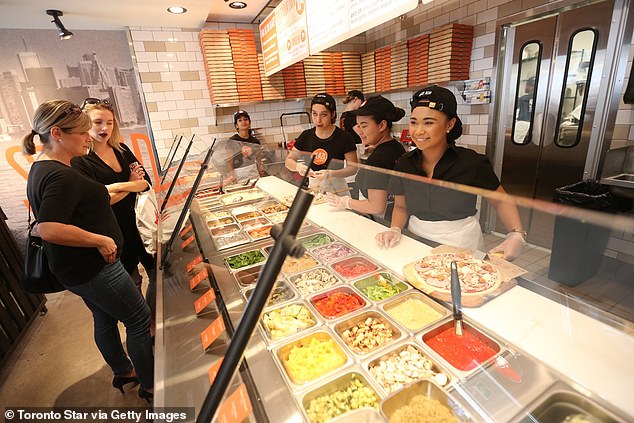
Blaze Pizza is moving its headquarters from Pasadena to Atlanta, which will reduce the state tax rate by more than a third
Additionally, businesses have left the Golden State due to higher taxes.
Other corporate departures from Southern California in recent months include Neutrogena to New Jersey, QuickFee to Texas, Oak View Group to Colorado and Unical Aviation to Arizona.
Blaze Pizza confirmed that its 7,500 restaurant-level employees will not be affected by the move, while a small number of the 60 company employees will be offered “relocation options.”
“California is where this brand was born more than a decade ago, and we have a huge heart for communities across the state where so many of our restaurants are,” CEO Beto Guajardo said in a statement.
“Moving our headquarters to Atlanta will help us fuel our next wave of growth.”
The move comes as beloved chains have closed restaurants across California amid the minimum wage controversy, including Mexico’s Rubio’s Coastal Grill, which has filed for Chapter 11 bankruptcy and closed 48 locations across the state.
The California Business and Industrial Alliance (CABIA) blasted Governor Gavin Newsom for pushing through the law, which also meant businesses in the state would have to raise prices.
To highlight the law’s impact, the trade group took out an ad in the USA Today edition Thursday featuring fake “obituaries” of popular brands.
The tongue-in-cheek ad, titled “In Memoriam: Victims of Newsom’s minimum wage,” highlighted the issues facing smaller brands, including Rubio’s, and fast-food giants, including Pizza Hut, Burger King, Subway and McDonald’s.
It contains news clips documenting the changes companies have made in response to the wage increase.
This includes raising prices, letting go of workers to reduce labor costs – and in some cases closing locations.
One says: “A McDonald’s franchisee that owns 18 locations in California is considering shortening store hours, raising menu prices and delaying renovations to offset the impact of the state’s $20 per hour minimum wage for fast-food workers. ‘
Even before the law was made official earlier this year, chains like Pizza Hut and Round Table let go of more than a thousand delivery drivers to brace for the financial impact of the change.
The law, signed by Newsom last September, increases the minimum wage for fast food workers to $20 an hour at chains with more than 60 locations in the US.
That’s 25 percent more than California’s standard minimum wage of $16 an hour, which itself went into effect in January.
At the national level, Congress hasn’t touched the minimum wage in decades; it is still $7.25 per hour. Instead, so-called “wage wars” are playing out at the state level.
“California businesses have been targeted and targeted for years,” CABIA President and Founder Tom Manzo told Fox Business.
“It’s just another law that further puts businesses at risk.”
He said, “What entrepreneurs do is either sell, they don’t expand in California – they have expansion plans in several states – or they go out of business.”
Manzo claimed that civil servants were living in a “fantasy land” if they think drastic pay increases will actually help workers or businesses.
“You can only raise prices so much,” Manzo told the outlet. ‘And you see it. People aren’t going to pay $20 for a Big Mac. It’s not going to happen.’
When the Democratic governor signed the bill into law in 2023, Newsom said the state was “one step closer to fairer wages, safer and healthier working conditions and better training by giving hardworking fast-food workers a stronger voice and a seat at the table.”

Blaze has 330 restaurants in 38 states and six countries and CEO Beto Guajardo (pictured) claimed the move will fuel the ‘next wave of growth’
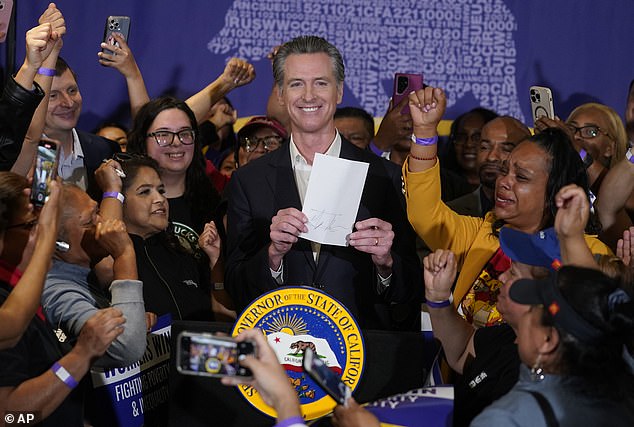
California Governor Gavin Newsom signed the fast food law on September 28, 2023, raising the minimum wage for certain chains
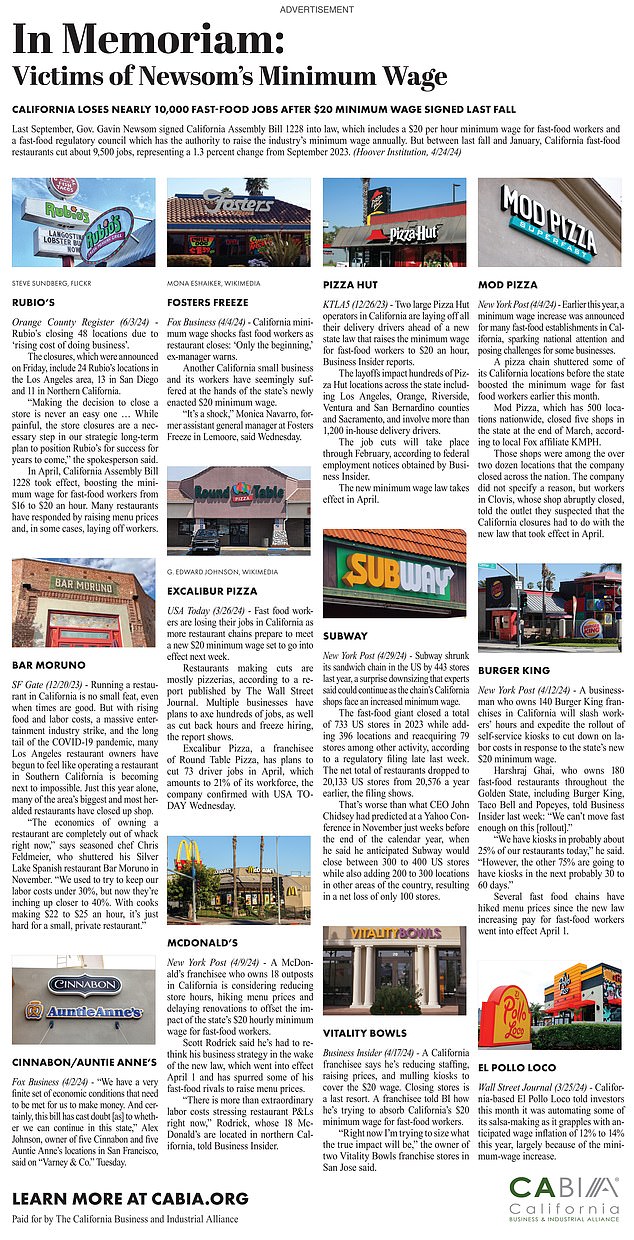
To highlight the law’s impact, a trade group on Thursday placed a fake ad in the USA Today edition featuring fake “obituaries” of popular brands
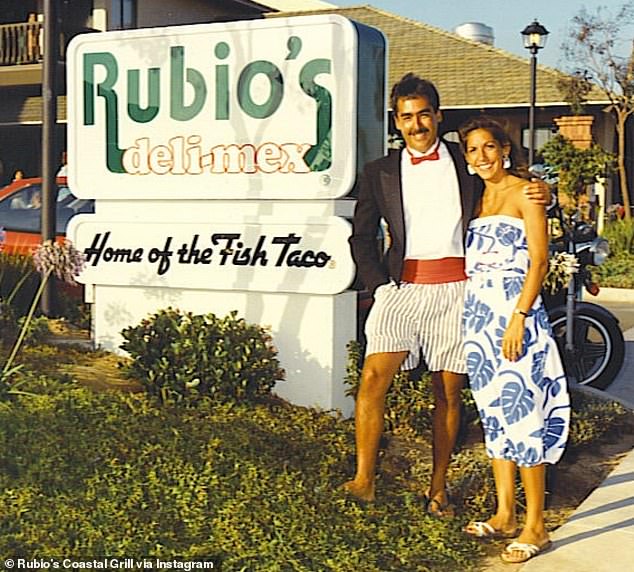
Rubio’s Coastal Grill announced it would close 48 restaurants in the state (Photo: The grand opening of the third Rubio’s location in the Pacific Beach neighborhood of San Diego, California in 1986)
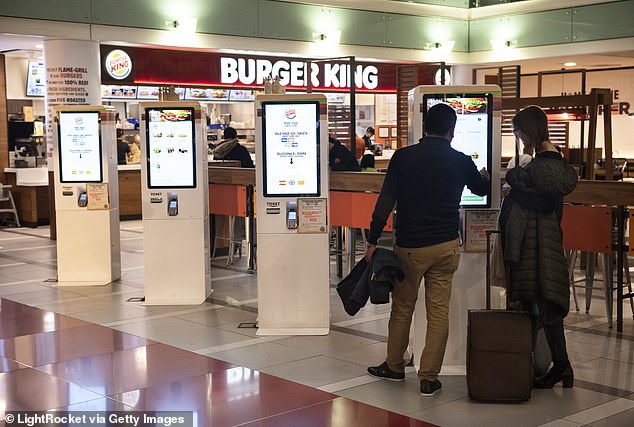
Critics warned that companies would turn to digital ordering kiosks as a way to reduce staff wage costs
When the Democratic governor signed the bill into law in 2023, Newsom said the state was “one step closer to fairer wages, safer and healthier working conditions and better training by giving hardworking fast-food workers a stronger voice and a seat at the table.”
But Republican critics argued that the wage increase would simply mean replacing workers with self-checkouts and “robot chefs.”
Harsh Ghai, a Burger King franchisee with 140 restaurants on the West Coast, announced in April how he plans to have digital kiosks installed at all of his locations within two months.
Until the pay increase, he planned to roll them out over the next five to 10 years.
